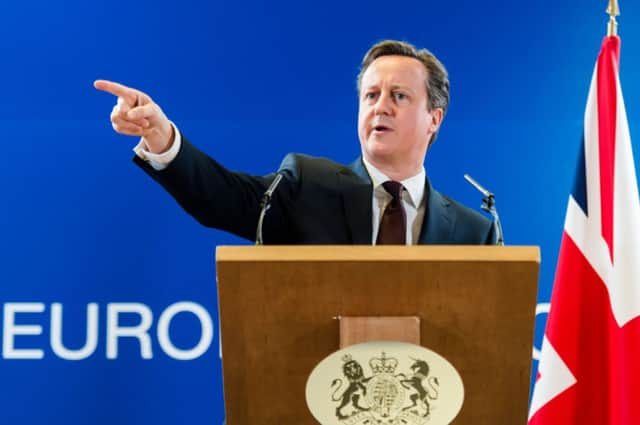Leaders: Cameron rolls the dice in European gamble


One thing is for certain: the Prime Minister has taken a gamble with his position on the European Union, spelled out yesterday in a major milestone in the general election campaign.
Mr Cameron rejected claims that he is facing Mission Impossible in his bid to reform the EU, insisting he will have a powerful “mandate for change” in Brussels if he wins the right to stay as Prime Minister.
Advertisement
Hide AdAdvertisement
Hide AdHe knows that Europe is the graveyard of previous Conservative leaders, and he is aware that a miscalculation on this issue will mean the end of his premiership.
Mr Cameron’s promise of a referendum on membership of the EU is going to be central to the campaign as we approach 7 May.
Its aim is to speak to those natural Conservative supporters who are tempted to vote for the UK Independence Party.
The Prime Minister’s prospects now hinge on whether enough of those switherers are persuadable to stick with the Tories, or whether they are already lost to the charms of Ukip leader Nigel Farage.
The risk for Mr Cameron is that his carefully finessed position on Europe ends up pleasing no-one.
Rabid eurosceptics are upset he is not committing the Conservative party to a Brexit – a British exit. Meanwhile pro-Europeans are appalled that he is holding a referendum at all.
A further weakness in his position is his optimism at achieving structural reforms in the EU, on budgets, competencies and decision-making – a positivity that is not at all shared by observers of European diplomacy.
Should he have done more to appeal to eurosceptics? Definitely not, say pro-Europeans in the Tory party. They believe Mr Cameron over-reacted to the rise of Ukip and, crucially, misread the nature of Mr Farage’s party.
Advertisement
Hide AdAdvertisement
Hide AdUkip is not, they argue, a single-issue anti-EU pressure group but a party opposed to cosmopolitan elites, multiculturalism, gay rights and modernity in general.
The question is whether any policy is capable of assuaging their anger, which owes more to a generalised discontent with society than any constitutional analysis.
And yet there is no doubt Mr Cameron’s fate now depends on how much of his core vote breaks off to the right – just as Ed Miliband’s depends on how much core support he loses to the SNP and the Greens.
Both main UK parties are in the curious position of fighting on their flanks rather than fighting each other.
And with Labour and Tories so close in the opinion polls – most surveys showing the lead for one or the other within the margin of error – these battles may well decide who emerges victorious after 7 May.
Invite the world to the Festival
NICK Barley’s idea that the best moments of the Edinburgh festivals should be broadcast to the rest of the world, for a fee, is one that has a great deal of merit.
The director of the Edinburgh International Book Festival yesterday used the example of Glastonbury as a festival that is enjoyed across the globe, and is not limited to people who make the journey to a field in Somerset.
Cynics might point out that the acts at Glastonbury are among the most successful commercial artists in the world, with a popularity that few among the hundreds of shows in Edinburgh in August could match.
Advertisement
Hide AdAdvertisement
Hide AdBut that would be to underestimate the pulling power of some of the world’s greatest authors, some of the world’s greatest classical musicians and orchestras, and some of the finest theatre and opera available anywhere. It would also be to underestimate the appeal of the comedy acts that dominate the Edinburgh Festival Fringe.
Taken together, the world’s biggest arts and entertainment festival must have significant commercial potential – although one already feels pity for whoever would have to untangle the contractual complexities.
There are already models to learn from – New York’s Metropolitan Opera and the National Theatre in London have subscription services that make these companies money.
Whether or not this comes to fruition, Mr Barley should be congratulated for his forward thinking. He has realised what some other arts administrators still find hard to accept – that the arts must try their best to stand on their own commercial feet, and not rely on money from the public purse.